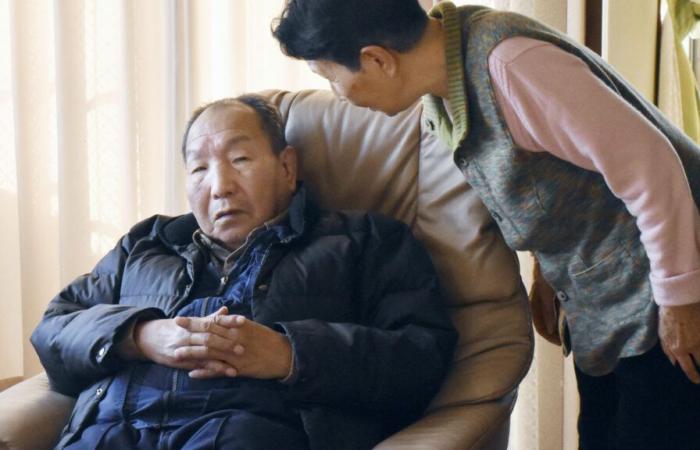Kyodo via Reuters Connect
Iwao Hakamada, seen here in 2020, was exonerated of a quadruple murder he was convicted of in 1968.
JAPAN – Half a century later. Iwao Hakamada, an 88-year-old Japanese man, was found innocent Thursday of the quadruple murder for which he was sentenced to death in 1968 and which earned him 46 years on death row. Just minutes after the verdict in the retrial of this extraordinary case, the old man was filmed by Japanese media leaving his home.
The case, which began in 1966, is a symbol for supporters of the abolition of the death penalty in Japan, who are fewer in number in the archipelago according to polls than those who are in favour of it.
Physically and mentally weakened by nearly five decades of waiting for execution, the world’s longest-serving death row inmate did not attend the hearing in Shizuoka, not far from where he lives. Wearing a sleeveless vest over a light-colored shirt and a hat, Hakamada walked down a few steps, supported by a woman, before getting into a car. Local media reported that his relatives had made sure he would not watch television during the verdict.
Confessions extracted under duress
According to his sister, he lives “now in an imaginary world and his words have no meaning” after spending nearly five decades on death row, often in solitary confinement, where every day could be his last. Because in Japan, death row inmates are often notified at the very last moment of their execution by hanging, the only method permitted in the archipelago, which has just over 100 death row inmates in its prisons.
A former boxer turned employee at a miso (fermented soybean) manufacturing company, Iwao Hakamada was accused of murdering his boss and three members of his family in 1966 and was sentenced to death two years later. But the judge ultimately cast serious doubt on the investigation. “The court found that three pieces of evidence were fabricated suggesting that the accused was the perpetrator of the crime. Excluding these pieces of evidence, the other evidence against him is not sufficient to establish” his guilt, the judge said.
He also described the interrogations “inhuman” aimed at inflicting a “physical and mental pain” and to “make statements under duress”a thesis that his lawyers have always supported. Although he initially admitted the facts, he eventually retracted them, citing the interrogation methods.
The risk of an appeal by prosecutors
His death sentence was, however, upheld in 1980. In 2014, a court acknowledged doubts about his guilt after tests showed that DNA found on bloody clothing did not match his own. After this episode, Iwap Hakamada was released, but it was not until 2020 that the Supreme Court allowed him to be retried. And so it was the verdict of this retrial that was announced this Thursday.
“When the court declared that the accused was not guilty, it seemed divine to me. I was so moved and happy to hear it that I could not stop crying. But they were tears of joy.”said Hideko Hakamada, his sister, at a news conference late in the day with her lawyers.
This very rare verdict of innocence also delighted his supporters, who gathered in front of the court from the start of the day with T-shirts and banners of support. “The verdict was what we expected. Our next action is to demand that prosecutors not appeal.”said Akiko Abe, a 64-year-old Japanese woman, fearing that the prosecution, which has until October 10 to respond, will use this right.
Also see on The HuffPost :
Reading this content may result in the deposit of cookies by the third-party operator who hosts it. Given the choices you have expressed regarding the deposit of cookies, we have blocked the display of this content. If you wish to access it, you must accept the “Third-party content” cookie category by clicking on the button below.
Play Video






